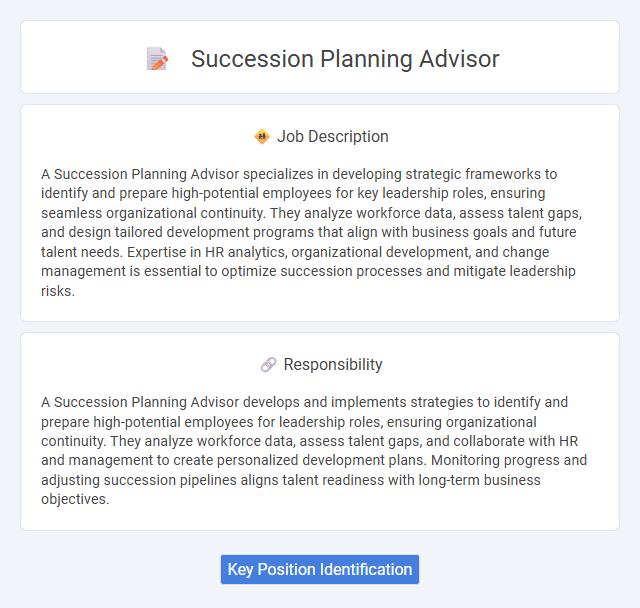
A Succession Planning Advisor specializes in developing strategic frameworks to identify and prepare high-potential employees for key leadership roles, ensuring seamless organizational continuity. They analyze workforce data, assess talent gaps, and design tailored development programs that align with business goals and future talent needs. Expertise in HR analytics, organizational development, and change management is essential to optimize succession processes and mitigate leadership risks.
Individuals with strong analytical skills, strategic thinking, and excellent interpersonal abilities are likely to be well-suited for a Succession Planning Advisor role. Those who thrive in dynamic environments and demonstrate a proactive approach to identifying and developing talent may find this career fulfilling. Conversely, candidates lacking attention to detail or struggling with long-term planning might face challenges in meeting the demands of this position.
Qualification
A Succession Planning Advisor requires strong expertise in human resources management, organizational development, and strategic workforce planning. Proficiency in data analysis, talent assessment, and leadership development frameworks is essential, alongside excellent communication and project management skills. A relevant bachelor's or master's degree and experience with succession planning software further enhance qualification credentials.
Responsibility
A Succession Planning Advisor develops and implements strategies to identify and prepare high-potential employees for leadership roles, ensuring organizational continuity. They analyze workforce data, assess talent gaps, and collaborate with HR and management to create personalized development plans. Monitoring progress and adjusting succession pipelines aligns talent readiness with long-term business objectives.
Benefit
A Succession Planning Advisor likely enhances organizational stability by identifying and developing future leaders, ensuring a seamless transition during leadership changes. They probably reduce the risk of talent gaps by implementing strategic development plans tailored to key positions. This role may improve employee retention and engagement through clear career pathways and growth opportunities.
Challenge
Succession Planning Advisor roles likely involve navigating complex organizational dynamics to identify and develop future leaders, presenting challenges in aligning talent strategies with business goals. The position may require managing uncertainties related to workforce changes and ensuring continuity in key roles, which can be difficult in rapidly evolving industries. Emphasis on accurately assessing employee potential and mitigating risks of leadership gaps probably constitutes a significant challenge in this role.
Career Advancement
A Succession Planning Advisor plays a pivotal role in identifying and developing future leaders within an organization, ensuring smooth transitions in key positions. Expertise in talent assessment, leadership development, and workforce analytics enhances career advancement prospects in human resources management. Proficiency in strategic planning and communication skills is essential for driving organizational growth and securing leadership pipelines.
Key Terms
Key Position Identification
Key position identification in succession planning is a critical process that involves analyzing organizational roles to pinpoint positions essential for business continuity and strategic success. This task requires evaluating job functions, impact on company goals, and potential talent gaps to ensure a robust pipeline of qualified candidates ready to step into these roles. Effective identification of key positions supports risk management and enables targeted development plans to maintain leadership and operational stability.
 kuljobs.com
kuljobs.com